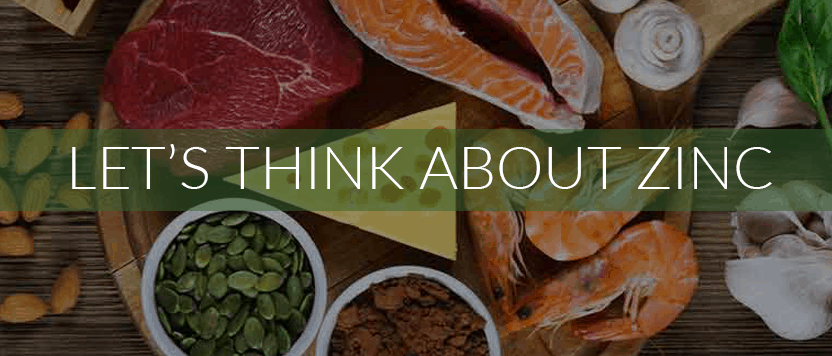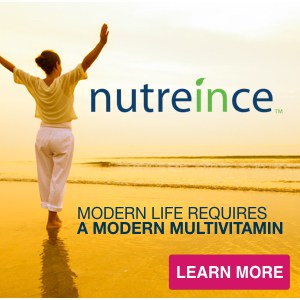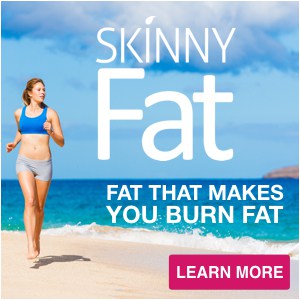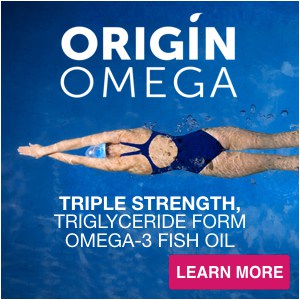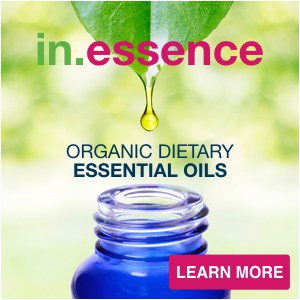Zinc may not be one of the mighty micronutrients most people know a lot about. Perhaps you have seen or taken those zinc-containing cold lozenge at the drugstore in an attempt to boost your immune system? Some micronutrients can make a huge impact on our immune health, and we may go out of our way to eat or supplement them. Many of us have turned to immune boosting vitamins and minerals such as vitamin D, vitamin C, or zinc to help us stay strong against illness. But zinc isn’t just an immune booster- becoming sufficient in zinc can pay big dividends over time!
Zinc supports many current global health concerns, from digestion, detoxification, anxiety and depression, to skin health, fertility, and more. However, according to the USDA 30% of Americans over the age of 2 do not get the minimum amount of zinc required to maintain basic health from our diets, and many of us need more zinc to bolster our antioxidant defenses, repair and heal tissues, or support a healthy mind. So sit back, relax, and get ready to think zinc!
Zinc Deficiency Increases Disease Risk
Essential for all forms of life, zinc was first discovered in human enzymes as part of carbonic anhydrase[1] in 1939.[2] By the 1980s, more and more zinc dependent enzymes had been discovered, and researchers looked with curiosity at the “zinc finger” proteins that are so important for DNA replication. Today, we know that zinc is an essential trace mineral used in over 300 important enzymes- and that our genome has genetic instructions to make over 3000 zinc-containing proteins![3]
Clinical symptoms of zinc deficiency have been shown to be present in the absence of abnormal laboratory values for zinc, most likely because zinc is tightly regulated in the blood.[4] Because adequate zinc levels are important for basic metabolism, growth, development, cell regulation, and more, zinc deficiency and insufficiency are associated with several problems, including:[5]
- Depressed Immune Function
- Increased Risk of Common Cold
- Slow Wound Healing
- Diarrhea
- Age Related Macular Degeneration
- Growth Failure
- Delayed Sexual Maturation
- Depression and Mental Lethargy
- Impaired Taste and/or Smell
- Poor Appetite
- Night Blindness
- Stretch Marks
- Acne / Inflamed Skin / Eczema
- Eye lesions
- Hair loss
- Anxiety / Depression
Are you at High Risk for Zinc Deficiency?
Most people deficient in zinc simply do not consume enough.[6] Beyond inadequate intake, people at the greatest risk of zinc deficiency include:
- People consuming a “Standard American Diet” (low in fiber, high in toxins and empty carbs)
- People consuming a high carbohydrate diet or gluten-free diet,
- People consuming a vegan diet, or vegetarian diet
- People with low protein intakes
- Alcoholics
- Pregnant Women
- Elderly people
- People with age related macular degeneration
- People with type 1 or type 2 diabetes
- People with malabsorption issues, including inflammatory bowel diseases such as Crohn’s disease
Zinc Does More Than You Think
Zinc is an important trace mineral that you must consume in order to survive and has several important functions:
- Eases Labor and Delivery. It has been estimated that more than 80% of pregnant women worldwide have inadequate zinc intakes. Low zinc intake and low zinc levels are associated with premature delivery, low birth weight challenges, and problems with labor and delivery.
- Stimulates Growth and Development. Zinc deficiency in animals and humans is associated not only with challenges during gestation and delivery, but also with growing up well afterwards. Zinc is not only involved in DNA replication and therefore the manufacture of every new cell, but also is associated with increased levels of growth hormone and IGF-1, which drive growth.[7]
- Boosts Basic Immunity. Zinc helps regulate many immune system activities, such as helping boost production of white blood cells and both your innate and coordinated immune responses. Even mild to moderate zinc deficiency can tank many of your best soldiers: macrophages, neutrophils, lymphocytes, natural killer cells, and the complement system cells that support their activity. Zinc deficiency can also damage macrophages[8] and produce an imbalance in T cell production[9] that weakens immunity. In fact, zinc status is a good predictor of illness in susceptible young[10] and old populations.[11] Zinc may actually prevent the rhinovirus (common cold) from binding in our respiratory tract, indicating another mechanism for its efficacy in everyday illness.[12]
- Improves Intestinal Integrity. You need zinc to hold tight junctions between the cells of your intestinal wall together. When these junctions fail, a condition known as intestinal permeability or “leaky gut” can follow, compromising digestion and inviting food intolerances.[13] Zinc is also important for the quickly-turned-over digestive tract cells that- just like our outside skin layers- must be replaced constantly.
- Increases Taste, Smell, and Eating Enjoyment. Gustin, a small protein that supports taste, must be attached to zinc to do its job.[14] This is why many older people, who are suffering from a zinc deficiency, often add so much salt and sugar to their food. Not because they are craving salt and/or sugar, but because their zinc deficiency has made it so they cannot taste their food properly. Often times supplementing with zinc can reverse this issue.
- Speeds Wound Healing. Because zinc is needed to make all new cells, it is particularly important for the healing of scars, burns, stretchmarks, and surgical markings.
- Supports Skin and Tissue Turnover. Zinc is an essential growth factor because it supports DNA replication and nourishes cell division.[15] Quickly dividing cells, such as the skin that lines your body, gut, and urinary tract, are particularly needy, and zinc deficiency is associated with skin problems such as dermatitis. Zinc helps imbue plasma membranes with sulfhydryl groups at the end of their manufacture, which they need to work properly.[16] As such, zinc deficiency is associated with cell membranes with reduced fluidity and compromised function.[17]
- Helps You See Clearly. Adequate zinc can support night vision and reduce your risk of age-related macular degeneration.
- Revs the Thyroid. You need zinc to make thyroid hormones. Zinc deficiency can correlate with reduced metabolic rate, likely from the reduction in thyroid hormone production.[18] Zinc deficiency may also be associated with thyroid-associated hair loss.
- Helps Balance Blood Sugar. Zinc encourages a normal, healthy insulin response. Insulin levels decrease without enough zinc, destabilizing blood sugar.
- Supports Sexual Healing. Zinc supports production of estrogen and testosterone, and is important for fertilization. You need zinc to make mature, healthy sperm as well as to ovulate.
- Nourishes the Nervous System. Zinc deficiency is associated with low levels of the neurotransmitters GABA, serotonin, and dopamine as well as copper overload that can lead to anxiety.[19] Zinc also helps protect your brain tissues from damage.
- Builds the Blood. Microcytic, or small-celled anemia, may be due to iron deficiency, but also zinc deficiency. Zinc supports certain compounds you need to use iron effectively.[20]
- Bolsters Bone Mineral Maintenance. Zinc supplementation has been shown to improve bone mass density in osteoporosis prevention interventions as zinc content in bone decreases with advancing age. Zinc both pumps up levels of bone building cells (osteoblasts) and lowers the number of bone-breaking cells (osteoclasts), while helping to activate a key enzyme (aminoacyl-tRNA synthetase) that is needed to make bone proteins.[21] Zinc is required in the production of the matrix of collagen protein threads on which the bone-forming calcium-phosphorus compound is deposited. Proper calcium absorption also depends on zinc, and a deficiency prevents full absorption of calcium. A zinc deficiency will delays bone growth, bone development, and maintenance of bone health. Low serum zinc is associated with low Bone Mineral Density (BMD) in women, which is the test for osteoporosis.
Considering its many roles, zinc may be used in the prevention and/or treatment of:
- Acne
- Allergies
- Alzheimer’s Disease / Dementia
- Anxiety
- Depression
- Dermatitis, especially Eczema
- Type 1 and 2 Diabetes
- Fibromyalgia
- Frequent Bruising
- Gout
- HIV
- Impaired Immunity (Frequent Illness)
- Infertility
- Inflammation
- Insomnia
- Macular Degeneration
- Menopausal Symptoms
- Obesity
- Osteopenia and Osteoporosis
- Poor Appetite
- PMS
- Poor Appetite
- Thyroid Problems
Clearly, zinc is too important for you to ignore! Let’s focus for a moment on two common conditions that can be deeply affected by zinc deficiency:
- Anxiety and Depression. According to William Walsh, Ph.D, zinc deficiency is the most frequently observed chemical imbalance in mental health populations. He states that over 90 percent of assessed people diagnosed with depression, ADHD, autism,[22] behavioral disorders, and schizophrenia show low zinc levels ranging from the low end of normal to severe deficiency.[23] Zinc nourishes your nervous system in several ways that can reduce both anxiety and depression:
- As an antioxidant, zinc protects your brain from free radical damage which can alter neurotransmitter levels and damage the body and myelin sheaths of brain cells.
- As a support nutrient for metallothionein, zinc supports border patrol, helping to scavenge harmful chemicals at the blood brain barrier.[24]
- As a cofactor, zinc helps you convert vitamin B6 from your diet into the active form pyridoxal 5 phosphate (PLP), which you need to make serotonin, dopamine, GABA, and other neurotransmitters that keep you happy, alert, and calm.
- As a stored mineral, zinc deficiency can permit a copper overload that can lead to high norepinephrine levels, driving anxiety.
- As a neurotransmitter, zinc is stored in vesicles in brain cells and released into synapses, independent of any other effects.[25] For instance, zinc can bind to and increase the firing threshold for NMDA receptors, reducing their activity and potentially reducing anxiety.[26]
- As a cofactor, zinc helps you build calcium-dependent potassium channels that you use throughout body and brain. This same chemical manufacturing applies to all the cell membranes in your body, including your brain. In these ways, a zinc deficiency can severely compromise neurological communication.[27]
- Diabetes. Zinc has been shown to benefit people with both Type 1 and Type 2 diabetes, both due to improving blood sugar control and improving cholesterol levels.[28] There are several reasons this may be the case:
- Your pancreas’ beta cells need zinc to make insulin, which your body uses to get blood sugar into cells.[29] In most diabetic patients, insulin receptors are insensitive, and more insulin is needed to communicate effectively. This insulin production taxes zinc levels.
- Zinc’s antioxidant activity may protect against worsening of both diabetes and its constant companion, heart disease. Zinc is needed to help your body make important free radical scavengers with difficult superhero names like glutathione, metallothionein, superoxide dismutase, and catalase.[30]
- Zinc helps burn the sugar you have (boosts glycolysis) and reduces output of new sugar from your liver (reduces gluconeogenesis), a goal sought by some diabetes medications.[31]
- Zinc can reduce the activity of certain enzymes in the small intestine that break down sugars, reducing the sugar you may absorb from certain meals.
- Zinc contributes to cellular repair and cell division. New healthy cells often boast better insulin sensitivity than their aged and battered counterparts.
With all these amazing benefits of adequate zinc status, let’s break down how to get it with a focus on foods, mindful lifestyle choices, and smart supplementation.
Zero in on Zinc!
STEP ONE – FOOD: Choose foods rich in zinc and avoid foods that deplete it.
- Choose foods rich in zinc. Animal proteins have more bioavailable zinc than plant proteins. Most foods rich in zinc are also rich in iron, such as meats and shellfish. Rich sources include oysters, meats especially beef, liver, dungeness crab, dark meat chicken, eggs, pork, lamb, whole grains, nuts, green peas, and pumpkin seeds.
- Power up with Protein. Vegan and vegetarian diets have been associated with zinc deficiency due to a low animal protein intake and sometimes low stomach acid production, which may negatively affect zinc absorption. Consider diversifying your protein intake or covering your bases with a high quality multivitamin.
- Avoid Antinutrients. In 1961, it was observed that a zinc deficiency in young men caused “adolescent nutritional dwarfism.” The zinc deficiency was thought to be due to diets high in foods containing large amounts of phytates, which block absorption of zinc as well as niacin (vitamin B3), vitamin D, iron, copper, magnesium, manganese, chromium and calcium. Oral zinc supplementation was able to reduce most overt symptoms of zinc deficiency in these young men. Sprouting and soaking your legumes, grains, nuts, and seeds can reduce (but not eliminate) the anti-nutritive effect of phytates. You’ll find higher phytate levels in grains and plant proteins such as wheat, oats, brown rice, corn, soy and other beans (legumes), nuts, and seeds (including flax and chia). Some fruits and vegetables are particularly high in phytates, such as figs, artichokes, carrots, potatoes, broccoli, strawberries, and apples. You should also be aware that tannins, another plant-based antinutrient, also deplete zinc. Be mindful not to overdo it with high tannin foods such as coffee, tea, red wine, rhubarb, pomegranates, berries, apples, grapes, red beans, lentils, chocolate, barley, nuts, and most spices.[32]
- Choose whole foods and consider your cooking methods. Food processing removes 75% of zinc content from grains. Cooking with water will cause greater zinc loss- avoid boiling and blanching.
- Pass on the Fried Food. Fried and especially burnt foods cause free radical formation With the help of other antioxidants, zinc supports key enzymes like superoxide dismutase that fights those free radicals.[33]
- Give thought to Gluten-free. Gluten-free diets have been shown to increase risk for zinc deficiency (as well as vitamin A, the B vitamins, vitamin D, calcium, iron, magnesium, and phosphorus). If you consume a gluten-free diet, you may choose to cover your bases by eating more proteins rich in zinc or consider supplementation for greater peace of mind.[34]
- Avoid Excessive Alcohol. Alcohol reduces your ability to absorb zinc as well as fat soluble vitamins, water soluble vitamins, essential fatty acids, other important minerals, and amino acids. [35]
- Step away from the Sugar. Consume lots of sugar or high fructose corn syrup and you will risk depleting zinc as well as vitamin C, calcium, chromium, copper, and magnesium. Avoid pre-packaged goods with added sugars in any form, especially corn syrup, dextrose, sucrose, and fructose. For a complete breakdown of sugary additives in processed food products, consult our book, The Micronutrient Miracle.[36]
- Monitor for MSG. Monosodium glutamate can drive sensitivities in many people and in depletes zinc, vitamin C, vitamin E, chromium, magnesium, and selenium. Many prepackaged food items and some restaurant foods contain MSG, the “flavor enhancer.” Use natural proteins high in glutamate, such as meats, fish, poultry, beans, or mushrooms to savor the flavor, but skip the MSG. Again, for a list of ingredients that may indicate your food choice contains MSG, consult our book, The Micronutrient Miracle!
STEP TWO – LIFESTYLE: Consider your digestion, medications, and overall health to support your zinc status. While we cannot slow the natural aging process that may reduce overall zinc absorption, there is much you can do to reduce your risk of depletion.
- Live a Low-Lead Lifestyle. Lead persists in soils, paint, and other sources and depletes many micronutrients, including the minerals zinc, selenium, iron, calcium, and phosphorus. Especially for developing children, lead poses several risks including brain damage. Heavy metals are so toxic and pervasive that we spare no expense with quality testing for our POWER plant protein, guaranteeing you low levels of arsenic, lead, mercury, and cadmium.
- Love your Lungs. While you may have limited control over the air quality where you live, you can do a lot to avoid exercising in smoggy areas, control the quality of the air inside your home, and take more drastic precautions when travelling to high smog places. Exposure to thick, smoggy air pollution can deplete zinc, selenium, manganese, copper, alpha-lipoic acid, and vitamins A, C, D, and E. If you smoke, find a way to stop- not just to avoid lung cancer directly, but to stop the daily depletion critical micronutrients such as zinc, selenium, alpha-lipoic acid, and vitamins A, B1, B6, B9 (folate), C, and E.
- Reduce your Toxic Exposure. Common household chemicals are less than innocent, and can deplete your levels of, at minimum, zinc, selenium, alpha-lipoic acid, and vitamins A, C, and E. We have written extensively about this topic in our books and on our blog, where you can read some top tips on reducing your exposure to common household toxins.
- Mind your Medications. These medications can deplete zinc levels. Make careful choices for both your short and long term needs. Check out this list and determine whether you are at risk for medication-induced zinc deficiency:
- NSAIDS such as ibuprofen (Advil, Motrin), and naproxen (Aleve, Midol)
- Aspirin (Bufferin, St. Joseph, Bayer, Excedrin)
- Antacids (Gaviscon, Gelusil, Maalox, Mylanta)
- H2 inhibitors / H2 blockers such as Axid, Pepcid, Tagamet, and Zantac
- Proton Pump Inhibitors such as lansoprazole (Prevacid), omeprazole (Losec, Prilosec), rabeprazole (Aciphex), and pantoprazole (Pantoloc, Protonix, Nexium)
- ACE Inhibitors such as lisinopril (Prinivil, Zestril), ramipril (Altace), quinapril (Accupril), and enalapril (Vasotec)
- Thiazide Diuretics such as hydrochlorothiazide (Esidrix, Hydrodiuril, Oretic)
- Loop Diuretics such as bumetanide (Bumex, Burinex), ethacrynic acid (Edecrin), furosemide (Lasix), and torsemide (Demadex)
- Potassium-Sparing Diuretics such as amiloride (Midamor), spironolactone (Aldactone), triamterene (Maxzide, Dyazide, Dyrenium)
- Corticosteroids such as cortisone (Cortone), hydrocortisone (Cortef, Hydrocortone), prednisone (Deltasone, Meticorten, Orasone, Panasol-S), prednisolone (Delta-Cortef, Prelone, Pediapred), triamcinolone (Aristocort, Atolone, Kenacort), methylprednisone (Medrol), fluticasone (Flonase, Cutivate, Veramyst), and beclomethasone (Beconase, Qvar, Vancenase, Vanceril)
- Conjugated Estrogens such as estrogen replacement therapies (Alora, Cenestin, Climara, Estinyl, Estrace, Estraderm, Estratab, FemPatch, Menest, Ogen, Premarin, Premphase, Prempro, Vivelle); and estrogen and progesterone–containing oral contraceptives (Ovral, Lo/Ovral, Low-Ogestrel)
- Fluoroquinolone antibiotics such as ciprofloxacin (Cipro), enoxacin (Penetrex), gatifloxacin (Tequin), levofloxacin (Levaquin), lomefloxacin (Maxaquin), moxifloxacin (Avelox), norfloxacin (Noroxin), ofloxacin (Floxin), sparfloxacin (Zagam), and trovafloxacin
- HIV-focused reverse transcriptase inhibitors such as azidothymidine (AZT) and zidovudine (Retrovir)
- Soothe Stress. Make time for yourself to rest, digest, and relax. Excessive stress puts you in di-stress and depletes zinc, selenium, magnesium, potassium, iodine, iron, copper, calcium, chromium, vitamin A, all of the B vitamins, vitamins C, D, and E, omega-3 fatty acids, and certain amino acids.[37] That’s stressful just to think about.
- Support Sleep. Lack of sleep is a chronic American affliction. Numerous studies have shown that lack of sleep can ruin blood sugar control, worsen risk of all cause mortality, compromise digestion, hinder liver detoxification, and more. We doubt you’d be surprised to know that lack of sleep pulls more strongly on certain nutrients, and can deplete your levels of zinc, potassium, magnesium, calcium, iodine, vitamins A, D, E, and K, and omega-3 fatty acids.
- Exercise Efficiently. Avoid extreme athleticism if you don’t plan on supplementing extra zinc to deal with the damage to your tissues. We don’t mean you should avoid regular activity as part of a balanced lifestyle. We mean you should have a balanced Excessive sweaty exercise can deplete zinc, selenium, potassium, manganese, magnesium, iron, CoQ10, alpha lipoic acid, and vitamins A, B2, C, and E. Both male and female athletes have lower serum zinc levels compared to sedentary individuals, and studies show that those who train without days off lose zinc even more quickly.[38] Consider the value of balancing hard, driving exercise with bodywork or meditation,, followed by a thorough night’s sleep.
- Munch Mindfully. Giving your body time to eat makes a huge difference in the production of the stomach acid that can can help you digest your zinc-containing protein-rich foods.
STEP THREE – SUPPLEMENTATION: Zinc is great- in moderation. Be smart!
- Avoid excessive supplementation of zinc. Zinc toxicity can cause nausea, vomiting, loss of appetite, abdominal cramps, diarrhea, and headaches. The tolerable upper level intake for zinc is 40 mg for adults.[39] We don’t recommend that you exceed that intake, especially when you consider micronutrient competitions! For example, high zinc intakes can compete with copper for absorption and lower copper levels, which you need for hundreds of important metabolic reactions.[40] Additionally, if you are supplementing with higher doses of zinc, micronutrient competitions may also be reducing your levels of calcium, iron, magnesium, and folate (vitamin B9).
- Seek Synergy. Seek out the sweet spot for supplementation to get the most out of your micronutrients- help them work together! Zinc can help you absorb and use certain vitamins and fatty acids. For instance, zinc helps convert vitamin A to its active form and is a component of retinol-binding protein, which helps carry vitamin A in your blood, as well as folate (vitamin B9)-binding protein. When adequate riboflavin (vitamin B2) is present with zinc, they improve each other’s absorption. Zinc also enhances vitamin D activity, supporting bone formation. Zinc deficiency can exacerbate an iodine deficiency. You may benefit from getting adequate levels of all of these vitamins and minerals from a balanced multivitamin such as nutreince. Furthermore, you need zinc to help you metabolize omega-3 fatty acids and omega-6 fatty acids into anti-inflammatory forms, such as EPA and GLA.
- Choose beneficial forms. Chelated forms of zinc, where zinc is complexed to an easy-to-absorb amino acid, both reduces the likelihood of nausea and improves absorption. Beneficial chelated forms include zinc arginate, zinc picolinate, and zinc glycinate, the form found in nutreince.
- Roll with the Recommended Daily Intake (RDI). The new adult RDI for zinc is 11 mg, the amount we provide in nutreince. Because we can obtain zinc from a diet rich in clean protein, the RDI is a good insurance policy and more should not be necessary to obtain micronutrient sufficiency- unless you have your reasons to suspect depletion! We strongly advise respecting the tolerable upper level intake set at 40 mg for long term supplementation.
Zinc may be at the end of the alphabet, but as you can see, it is truly a superstar! With potent antioxidant activity, support for healthy growth, development, and aging, and the rejuvenation of body and mind, zinc deficiency can make a huge difference in your quality of life. We highly recommend you don’t forget this essential nutrient when considering your overall wellness and long term mental health.
[1] https://pdb101.rcsb.org/motm/49
[2] https://www.ncbi.nlm.nih.gov/pmc/articles/PMC3648744/
[3] https://www.ncbi.nlm.nih.gov/pmc/articles/PMC3648744/
[4] https://www.ncbi.nlm.nih.gov/pubmed/16632171?dopt=Abstract
[5] https://ods.od.nih.gov/factsheets/Zinc-HealthProfessional/
[6] https://www.ncbi.nlm.nih.gov/pmc/articles/PMC3724376/
[7] https://academic.oup.com/jn/article/130/5/1500S/4686427
[8] https://www.ncbi.nlm.nih.gov/pubmed/30622979
[9] https://www.ncbi.nlm.nih.gov/pubmed/9227444
[10] https://www.ncbi.nlm.nih.gov/pubmed/9701154
[11] https://www.ncbi.nlm.nih.gov/pubmed/17921398
[12] https://www.ncbi.nlm.nih.gov/pubmed/15496046
[13] https://www.ncbi.nlm.nih.gov/pmc/articles/PMC4231515/
[14] https://www.ncbi.nlm.nih.gov/pmc/articles/PMC319674/
[15] http://www.jhrr.org/article.asp?issn=2394-2010;year=2014;volume=1;issue=1;spage=5;epage=9;aulast=Mahmood
[16] https://www.ncbi.nlm.nih.gov/pubmed/18353558
[17] https://www.ncbi.nlm.nih.gov/pmc/articles/PMC1223981/
[18] https://www.ncbi.nlm.nih.gov/pmc/articles/PMC3746228/
[19] Walsh, William. Nutrient Power. New York: Skyhorse, 2012.
[20] https://www.ncbi.nlm.nih.gov/pubmed/26931116
[21] https://www.ncbi.nlm.nih.gov/pubmed/20035439
[22] https://www.ncbi.nlm.nih.gov/pmc/articles/PMC4386645/
[23] Walsh, William. Nutrient Power. New York: Skyhorse, 2012.
[24] https://www.ncbi.nlm.nih.gov/pmc/articles/PMC2486367/
[25] https://www.ncbi.nlm.nih.gov/pubmed/18353558
[26] https://www.ncbi.nlm.nih.gov/pubmed/21504727
[27] https://www.ncbi.nlm.nih.gov/pubmed/10801956
[28] https://www.ncbi.nlm.nih.gov/pmc/articles/PMC4573932/
[29] https://www.ncbi.nlm.nih.gov/pmc/articles/PMC4573932/
[30] https://www.ncbi.nlm.nih.gov/pmc/articles/PMC4573932/
[31] https://www.ncbi.nlm.nih.gov/pmc/articles/PMC4573932/
[39] https://ods.od.nih.gov/factsheets/Zinc-HealthProfessional/
[40] https://ods.od.nih.gov/factsheets/Zinc-HealthProfessional/

